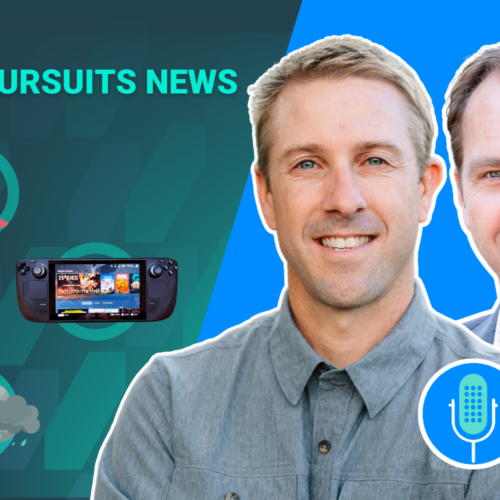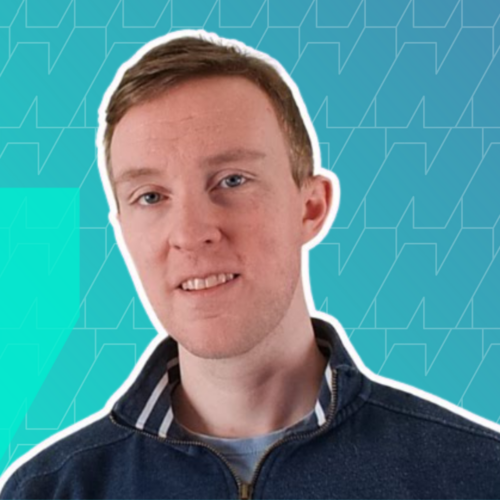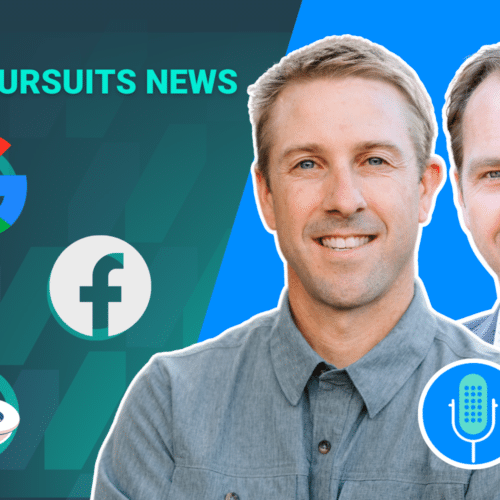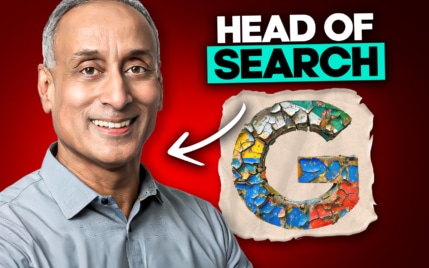How Stephen Hockman Sold a 1 Year Old Affiliate Site for Over $100k
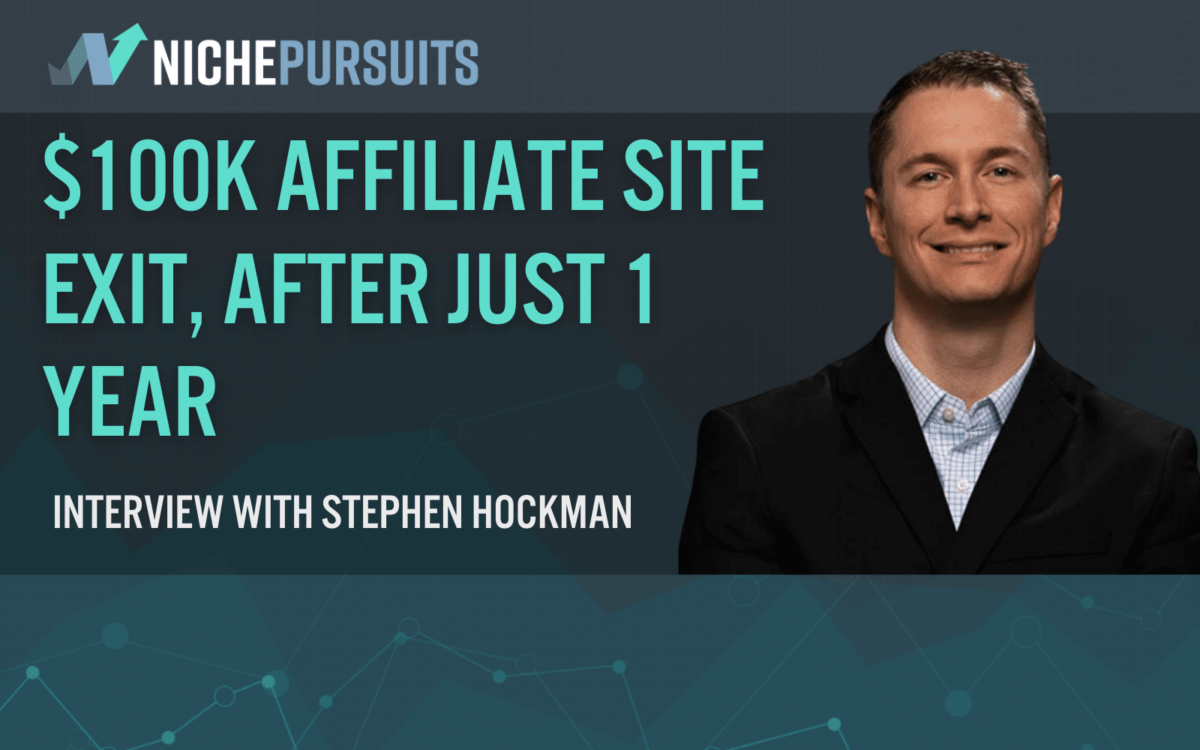
When you buy something through one of the links on our site, we may earn an affiliate commission.
Stephen Hockman of SEO Chatter has over 15 years of experience in affiliate marketing.
He's grown many affiliate sites, been through Google penalties, recently sold a niche site, written a book, and is currently building an SEO site in public, all the while sharing his strategies.
He's full of practical advice on SEO, content creation, and link building that you can actually use and implement today. He shares unique tips on starting up new websites the right way, internal linking, SEO, site structure, and a whole lot more.
Stephen previously came on the blog for this written interview, but this time he joins Jared Bauman on the podcast to share even more about his recent experiences.
He has just sold a 1-year-old affiliate site, built on a fresh domain, for over $100K!
Stephen shares the step-by-step process of how he pulled it off, including keyword and topic research, article structure, and on-page SEO. Best of all, he has plenty of practical tips on how to do it on a small budget.
Stephen has also released a course sharing the on-page SEO strategies that have got him to where he is today – I've taken the course and will share what I think below.
Get 50% OFF the Mastering On-Page SEO Course – exclusively for the Niche Pursuits audience!
Find out more info through our link here or read our course review below.
Use Coupon Code “NichePursuits” to Save 50%Contents
Steven Hockman Podcast Interview
Some of the topics covered in the podcast:
- The importance of creating a brand around your niche site
- A manual process for finding a new niche on Amazon
- The best types of niche to enter and products to market online
- The types of content he creates when starting a new website
- How to structure content based on what's ranking
Resources, services, and products mentioned in the podcast:
- Mangools SEO tools – what Stephen uses for keyword research and backlink analysis
- KW Finder – for long-tail keywords
- Link Whisper – for internal linking
- On-Page SEO Course – Stephen's course, use code ‘nichepursuits' for 50% OFF
- Surfer SEO – content optimizer
- Mediavine – ad network
- Ezoic – ad network
- SEO News – SEO Chatter, Stephen's affiliate marketing site
- Affiliate Content Strategies – Stephen's book
Who Is Stephen Hockman?

There are a lot of gurus out there, and everyone has a slightly different idea as to what's important and what's working today. And because doing it right can be the difference between your website's success or failure, you want to listen to someone who knows what they're doing!
The two reasons that I think that Stephen is worth listening to are his experience and track record.
SEO isn't something someone new can enter into and understand really well in a year or so. It takes quite a bit of experience to really get good at it, and Stephen has 15 years now.
As far as his track record goes, he has built up multiple 6-figure per year niche sites that get an exceptional amount of traffic and perform well over time. And, most recently, he's been able to rank his new SEO Chatter site very quickly for difficult keywords without having a strong website DR/DA.
For example, to rank in position 3 for ‘SEO news' with a new site is pretty impressive!
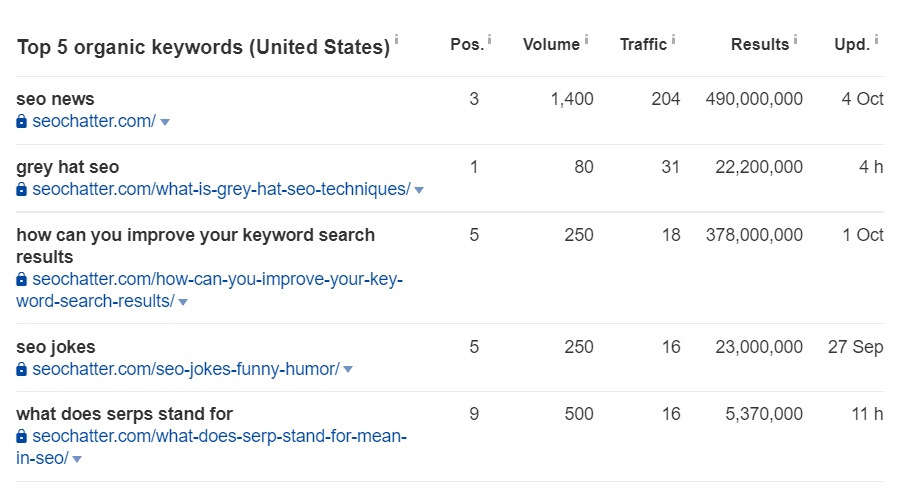
Lastly, I consider myself to be somewhat experienced in SEO and building niche sites, and after going through the entire course, I can tell you that it checks out.
While some parts were less helpful because they were more beginner level, other parts were really beneficial and I learned a few new tricks that I've started implementing.
But I'll save more of my thoughts for the review after I've shared what's in the course!
Mastering On-Page SEO Course
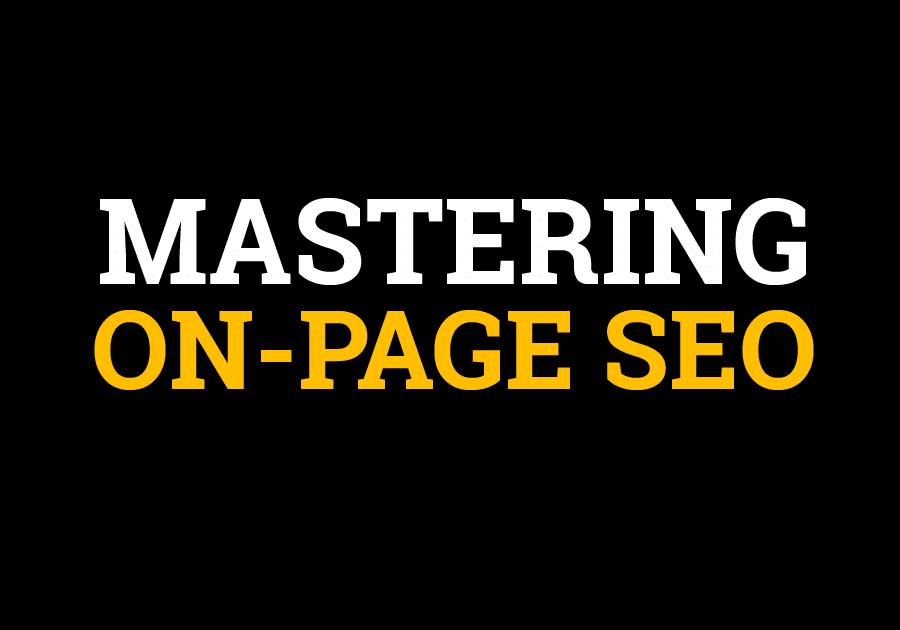
On-Page SEO refers to all of the things you can do to your website to make it more attractive to the search engines.
It covers things like:
- how you write your content and use keywords
- how you structure your URLs
- the heading tags you use on pages and posts
- meta descriptions for images, posts, and pages
- and much more
In the course, Stephen covers everything from choosing the perfect domain name to creating an internal linking strategy for your published posts.
The course starts with ‘The top on-page SEO factors and which to optimize first' and then jumps into an in-depth guide to website and post metadata.
And when I say in-depth, I mean in-depth!
For example, there are videos with the following titles:
- Meta tags explained
- Meta titles optimization
- Meta description optimization
And Stephen takes 15 – 20 minutes laying out his entire strategy, giving really good examples of how he does it, and what has worked time and time again.
At first, I didn't think I would learn anything new because I've been doing this for about 6 years now. However, I did pick A LOT that was really helpful.
I don't want too much away, but here's one example of something I had missed.
I never filled out the meta description or SEO title on the home pages of any of my sites (or any of the pages, for that matter). I only did this for my posts. So when my home page was showing up in search engines, it was just my site title and whatever Google wanted to put with it.
However, now I have very descriptive SEO titles and meta descriptions and it looks so much better. And, for SEO purposes, it gives Google a lot more to grab onto.
That's just one example of something I had missed, but I had 5 – 10 solid revelations like this through taking this course, making it well worth it.
On-Page SEO Topics Covered
This YouTube video is different from the course video which is an extended version with on-screen examples.
Besides the 4 or 5 metadata video trainings, what else is there in the course?
It includes 31 videos with over 6.5 hours of training you won’t find anywhere else, including:
- Domain name, URL, folder, and category optimization
- H1, H2 – H6 tag optimization
- How to write the perfect intro
- Body content, main content, and summary content explained
- Images explained: alt text, title, and file name optimization
- Menu optimization
- Internal linking optimization
And much more.
If it has to do with on-page SEO, you can expect to find it here.
Other resources include:
- an on-page SEO cheat sheet
- an extra 30+ minute video on writing and improving content
- a look at the SEO Chatter case study
The SEO case study is SEO Chatter, Stephen's SEO-focused website. In another extended video in the course, he goes through the changes he's made to the site over the year and shows the results.
SEO Chatter is one site (among others) where he puts what he teaches into practice.
The videos are really well presented with helpful slides and examples, the audio is great, and it's a very professional production.
Mastering On-Page SEO Price
This course is usually $397, but for a limited time, you can get it for 50% OFF.
You will get access to all of the video trainings, plus:
- lifetime updates
- access to future videos in the course
- all of the bonus content (a Mangools walkthrough, for example)
It's not a bad deal at all!
Just use code ‘nichepursuits' at check out and you'll get half off.
GET 50% OFF HEREMastering On-Page SEO Review
Overall, I really enjoyed this course and have got a lot out of it.
I found it really good to get into the nitty-gritty of on-page SEO and to see how someone else does it. We all have our own ways of doing things, our own habits, and best practices, but it's good to watch others and think about how we can improve.
After watching the course, I've rethought the way I write titles, create URLs, and the words I use on my home page – I've made a number of changes, and things only keep improving on my sites.
For the price, I think it's a good deal and a great opportunity to learn from someone who has done very well with niche and authority sites.
Pros:
- A very comprehensive on-page SEO course
- Well explained and presented
- Easy to understand and follow
- Everyone will learn something
- Easy to put the advice into action for most who are familiar with SEO
Cons:
- Targets users of all CMSs, not just WordPress (could also be a pro!)
- Implementation of advice is not always fleshed out
- Not all videos are for everybody (eg. domain name optimization best for those who haven't started)
While not all the videos will be relevant for everyone, if you're anything like me, you'll still enjoy watching them and storing away the info for the future.
Because this is a course for on-page SEO in general, not only for WordPress users, it means Stephen doesn't always go into exactly how to implement things. For example, you will learn how to create the perfect meta description, but not where or how to put it into a post.
However, I think most people, even beginners, can find the answers to these questions pretty quickly. Most people are directed to install Yoast or RankMath immediately after starting a site.
The pros far outweigh the cons, and I personally recommend the course for people at all stages of the SEO game.
On-Page SEO Mastery
On-Page SEO is one of the most important things to get right in online business.
Whether you have an affiliate site, ecommerce site, or any other site you want to get organic traffic to, make it easier on yourself by following the best up-to-date advice and guidance.
As I'm sure you've heard it said before, on-page SEO is the one thing you have total control over so it makes sense to milk it for all it's worth.
The Mastering On-Page SEO course by Stephen Hockman is a great way to do just that. If it's within your budget and an area you need to grow in, make sure you find out more to see if it's right for you.
READ THE FULL TRANSCRIPT:
Jared: Welcome. to the niche pursuits podcast. My name is Jared Bauman. Really excited to share today's interview with you. We have Stephen Hawkins. Steven is a veteran affiliate marketer of over 15 years. And so, as you can imagine, we have a lot to talk about Steven recently built a website from scratch on a fresh domain and less than a year later, sold it for over a hundred thousand dollars.
And so we go through a step-by-step process of exactly how he pulled this off. We talk about how he researches the topics that he writes about. We talk about article structure and we really drill into on page SEO, which Steven believes very strongly in. So he shares a lot of really great strategies for how to nail your on-page SEO.
And it's not using a lot of expensive software tools. As a matter of fact, he shares a. On page and keyword research tool that I'd never heard of before the one that he uses. So it's not all of this expensive type of stuff that he's doing to grow these websites. He really shares a lot of practical on page SEO tips.
Stephen talks a lot about his background. Like I said, he's been doing it for over 15 years is where he makes his full-time income. We talk about his very first web. About Bose headphones, we talk about how niche sites have changed over the years. He also shares a lot of tips on how to pick a niche. And so he gives some really good examples for people, some really tactical examples for people and how to vet other niches and other websites for competitiveness.
So overall, you're going to get a lot of value from this. Stephen now runs SEO chatter. And so we talk about how he's sharing his case studies and his SEO tips on SEO. Which is live today and you can go take a look at it. He's got a lot of great articles. He talk about how he's trying to rank those articles and what is a very competitive niche, which is SEO.
So I'm going to get a lot out of this. I really enjoyed the interview and I hope you do.
hello and welcome back to the niche pursuits podcast. My name is Jared Bartlett. I'm your host today and we are joined by Stephen Hawkman. Stephen. Welcome. Hey, thanks for having me sure thing really excited about today's interview. We have a veteran affiliate marketer with us today. I believe you said what?
15, 20 years of affiliate marketing. Yeah,
Stephen: I got started about 15 years ago and yeah, it's just been great, you know, I've been successful at it and I'm just excited to really just share some tips and tricks and things I've experienced along the way.
Jared: Great. Well, you have, probably have a ton of examples of what's working both in yesteryears and today in affiliate marketing maybe we'll even chat a little about pen, a penguin or a Panda or some of these old updates, but speaking of the old times and really the last 10 to 15 years.
Bring us up to speed on how you got started in affiliate marketing. And what was it that what was it that, that kind caught your ear about it?
Stephen: Yeah. So about mid two thousands, about 2005, 2007 or so I just kind of got this idea where I was like, you know, Just this idea of making passive income online, just kind of started the spur.
And so I tried different things. Like I started eBay business. I mean, that's really where I got started with like online let's make money online. Then I sold some like products on there and stuff. And so that was the first itch that got scratched. Well, then I stumbled across this video by a guy named ed Davis.
And he had come out with this thing called the 30 day challenge. And he showed you how to make your first dollar online with just these free videos he gave out. And it was, it just blew me away. I was like, wow, like I built this like free website on like a free WordPress or blogger. I can't remember what it was.
And I made this like one or two page site and I made like $2 19 cents my first month as an affiliate. I stumbled across that follow the process and it just became just this obsession from there. And so that's kind of where it got started. And I've now turned into a full-time career, essentially.
Jared: First website.
What was it about w w what were you selling to make this money on a, I guess Amazon affiliate. Yeah.
Stephen: Yeah. So at that time I was interested in Bose headphones. It was just like the popular brand. And so I was like, okay, I got to find something to promote for this like 30 zone. And I picked Bose headphones and they were noise canceling.
And back then, that was like the cool thing. And so I picked those and just pick some random version of it and I made like a one page review of it. And yeah, I deep. So people stumbled across the site and bought something and I made.
Jared: Oh, that's great. Yeah. I think I was caught up in that Bose headphones craze of the early two thousands as well.
So where did you scale? Did you start scaling it out from there? Or did you continue to dabble on the side? When did it start to become something that you put more effort into?
Stephen: Yeah. So once that happened, you know, that just set off. Flame where I was like, okay, I wanna, I want to do this. Cause just making free money online was like addicting.
And I was like, wow. Even it's two bucks. I mean, it's still amazing. So I just started to build a couple of our pages on that site and promote other Bose headphones stuff. And that grew a little bit of income. And then I just started to get into more, you know, I just started picking different niches that were interesting to me.
And so I started to create these just very, I can't remember all of them. Just various little niche sites with just free WordPress sites, you know with like just basic stuff and, and that kind of worked, but then I started to start to hone in on just the moment. Passionate stuff that I wanted to work on.
And then I figured, Hey, if I'm going to make this like something real, I really got to turn into a business, like just playing around with just these little like niche sites that I'm half interested in. Isn't really going to work. I really got to like go full steam ahead into something I care about. And so that's kind of what I did went full steam into a niche that I enjoy.
And then I was playing around with that for probably about, I don't know, five years or so, just, you know, just a side thing. I had a job at the time. If anyone's curious, I actually got my degree in video editing. So I was like a video editor and I would do commercials and training videos and stuff, but I always just had this passion for building a site in beat living and then making an income offline.
And so then I kind of, you know, I ended up going to like Amazon. I was like, you know, I really want to like boost this thing and actually make a ton of money. So I started scanning through Amazon and just looking for some products that I thought would be good for people that, where they had to go online to get information about it, to buy it, you know, it wasn't something they could just go to their local store and just browse around.
Cause back then, You know, it was kind of this half offline, half online mentality for a lot of people and now everything's online pretty much. And so that's kind of what I did. And I found this one product that I started promoting. It just became, came like my cash machine essentially up to this day.
And so I've had like this big brand site that promotes a certain type of product that people can really only experience online. They have to buy it online. And I'm the guy that informs on how to make the right decision to buy that. I
Jared: know when we were actually talking about off air a little bit, but back in the early days of the podcast, in the niche pursuits websites, Spencer was doing a lot of really small websites and getting them ranked and then building more and more and more with the goal of each side, just making a little bit of money.
And you talked about how that was something that. That you used to do as well? What, what caused that transition? Cause obviously the industry has shifted a bit the way the websites rank. Now you have, you, can't just really rank, you know, it's very rare to rank a one-page website or even a handful of pages on a website.
You have to have a much bigger website and you made that switch. Was there something that caused that switch to happen or what, what did you see happening in the industry that caused you to start transitioning out of a bunch of smaller sites and into, you know, kind of like you talked about a more focused, larger scale website.
Stephen: Yeah. So back in those days, people were creating these little micro niche sites and they would make three to five page sites and they, people would post online like, oh, I'm making thousands and thousands of dollars just from this like five page website. And I sell one little one product. And so that was a big, crazy.
I got in on that. It was fun. But yeah, I just started to notice a shift in the market and a shifting Google where that stuff just wasn't working anymore. You know, these little mini sites, just weren't getting ranked on page one and you'd have to, like, people were just throwing all this money in the back lanes and all this time.
And I thought to myself, I was like, you know, what, if I'm really going to make this my business, I have to create a brand. I have to get something where it's like, I'm the person for this product or this space. Kind of like the Wirecutter, you know, people know the Wirecutter, everybody knows the Wirecutter.
It's like, if you want like the best reviews on anything, you go there. You know, but then there's these other brands where it's like, you know, that they're the top person for this thing. Like, there's like a running I'm drawing a blank, but there's a running shoe site. There's an outdoor site, et cetera.
Like you go there, they're the top dog. And so I just realized, I was like, if, if this is going to be a full-time business, I need to put my energy into it and run it like a business. And that is becoming the, be all it all four minutes.
Jared: Okay, so that, that kind of catches us up to maybe the last few years, you've transitioned your model into larger websites.
And you talked about kind of a flagship website you have, or really more of a flagship focusing. I think that's really interesting that you, I think a lot of people tackle it maybe differently. They approach it differently where they go after. Either something that they're passionate about, they go after something that they see a specific opportunity in, they might not be all that interested in it, but it seems like you did a very interesting process to research and figure out the niche you wanted to be in and talk about how you kind of vetted that process and continue to build that website, or I guess really that collection of websites, it sounds like you kind of focus around that topic.
It's less about one website, but more about the topic in general.
Stephen: Yeah. So I have a couple of websites. There's one that. Generates, you know, the most income and that's the one I've had the longest. And so I start to dabble in these other niches and I'll build a site, get it profitable, and then I'll sell it.
And we can talk about one of those, which I like to talk about with people. Cause it's, it explains the process, but so I've got like this core side and I have other ones I've built up. And so essentially or I just keep them and just take the recurring income. And so my process for that, the way I, the way I find niches is.
I go into Amazon and I just kind of go through and browse through the categories and I just kind of play around and click the different buttons and I start to go three or four levels deep, and I try to look for a product. That is a, that's a must have item for certain people that have a problem to solve.
So I'll give you an example. I know somebody that is in the music industry and they have a site that does music. And so that's like a hobby niche. Right? And so, in my opinion, hobby, niches aren't as profitable through like an Amazon affiliate or trying to get direct deals because. When it comes to hobbies, people are very picky on what they want to buy, to support their hobby.
You know, they're very like, oh, let me compare and contrast all the different things. And they may or may not buy when they're on your site. They may just come there to get information. And at some later point decide, oh, I'm going to pick this product, you know? And now you've lost the commission. Cause you were, you know, you helped them make the decision, but you weren't the last click.
But what I like to do is I like to find. Problems that people have in pick that product that they have to solve by purchasing that thing online. And I'll give you one example. So part of the niche I'm in, so this is revealing. Some of it is air conditioners. Okay. You can't go into the store and test an air conditioner.
You have to buy it. And once the summer hits, people are hot, they want relief. And so what do they do? They are like, I need the best air conditioner for apartment. So they looked that up on, on online and they go to the first page and it's like, okay, I have a 300 square foot apartment or a thousand square foot.
What's the best air conditioner for that. This is it I'm buying it. Cause I want this in two days so that I can get relief from the heat. So that's the process. So that's something I look at it, I'm like, Hey, this is something you got to have, it's expensive and you gotta, you gotta solve a pain, a pain point.
And so that's the way that I approach niches. So yeah,
Jared: that's really okay. That's really interesting. And I want, if I can, I want to drill a little deeper into that. What other do you have. Just a quick off the top of your head checklist that people go through as they're evaluating different niche opportunities, because you talked about hobby versus, you know, almost need to have, must have that sort of thing.
And the air conditioning example makes a lot of sense when we bought an air conditioner for our house. I mean, it was like June and our air conditioner broke and we didn't have time. It kind of reminds me of water heaters. Like you're never really in the business. It seems of researching water heaters.
You only need a water heater when you need one and then you need one really quickly and you can't test it out and you can't bring it home and take it for a test drive or go into the store and take it for a test drive. That's a really interesting model to go after because these people have a different level of need.
And so they're gonna, they're gonna, they're gonna make a different purchase decision, but what other checklists, like, how do people go into Amazon and do this sort of research like you talked about, or is there a different way to research it to, to kind of vet some different.
Stephen: I mean, I like to keep my stuff simple.
I just go into the browse button and I click on it and just start drilling down and I just start exploring. And so I just start to, I mean, I just look in there and start looking for obscure things. You know, I'm not going to go after something that's popular or just exhausted in the marketplace. You know, I'm not going to go off their laptops.
I'm not going to go after. I don't know what else, just like, I'm kind of drawing a blank, but I'm not going to go after common things that people were buying and I'm going to look for something that's kind of unique and that people don't really know where to find information about or they don't have experience with it.
So like, I'm not going to do headphones. I'm not gonna do laptops. I'm not gonna do video cameras. I'm not going to do, you know, these just consumer product stuff. Yeah. But then I also one of my other criteria. Most of the products, they have to be at least $100 at least, or more because with Amazon's commission changes, you know, oh, one other tip too.
I always go for products that are in the 3% category. For commissions, because there's no point in going after the 1% or the 2%. So find out what products are in the 3% category and then make sure it's at least a hundred dollars or more for that product, because otherwise, you know, if you're trying, you're not going to make much money, you know, if you're out there just trying to review books, you're making pennies for every sale.
So that's really my criteria. Look, find something, know. 3% category, at least a hundred dollars or more. I try to average a $500 product or more if I can, because that's where the big money is in this affiliate marketing.
Jared: Okay. That's great. That's that's, that's a good checklist right there. I mean, you could spend days researching to find products that fit those types of categories.
Let's talk about the other side of it now. Competitiveness did you do when you're evaluating a niche and you've met, so you get a list of these, you know, we've talked about air conditioners. I mentioned water heaters. Not sure if that's a good one or not, but let's say we have this list of products that meet the criteria.
You talked about. How do you, on the other side research competitiveness, how you talked about you don't want. Niches that are exhausted or that have big competitors. Like how do you research that or using keyword research for that? Are you going into something like a tool like eight traps or is it a different process?
I'm curious how you vet which ones to go after, because you get quick results and we're going to talk about one of your case studies, where you get quick results here pretty quickly. But yeah, I mean, some niches you're going to be writing content in for years before you can, you can see results because of the competitive to, how do you evaluate.
Stephen: Okay. So the way I evaluate that is I'll try to take well, in a couple of ways what I like to do is I like to take the, one of the main keyword or too long in some belong Hills, and I just started to search for them. So I'll use a keyword tool. And the only one I use honestly, is mangles. And I use KW finder.
I don't use stuff. I have used them in the past, but everything I need. And this is probably going against the grain for most people that get on your show probably is they all promote these expensive monthly softwares. I'm telling you I have built a hundred thousand dollar websites with this tool alone main goals.
It's all you need to do the keyword research. To do backlink analysis, et cetera. So that's the one I push all the time and it's dirt cheap. I mean, it's the cheapest SEO tool out there that I know of that gives you everything you need. So, number one, don't feel like you have to be pressured to get these other tools.
That's my opinion. I've used it, but I'll use KW finder and I'll put in the, the main head term for like, you know, best air conditioners. And then I want to look through and I want to find. And that there are long tails attached to that. So you'll find best air conditioners for apartment best air conditioners for small room, best air conditioners for dorm room.
You know, you want to make sure that there's a, there's a lot of long tail keywords. You know, you want to look for like 20 to 30 at least so that, you know, Hey, I can make a 20 to 30 page. That is all about different types of air conditioners. And so once you do that, you know, okay, people are looking for various types in this niche.
That's good to go. If you type in your keyword and you only see like a couple variations of that. So I'll give you an example, years ago, I wanted to I was trying to sell, I wanted to get into NICU. So when you hurt your knee, you put a knee scooter on, you can roll around and not everybody, you know, has insurance and stuff.
So I thought, Hey man, this is great. They're expensive. I'm going to get into this niche. But I found out there was only a couple types of them. And so I was like, oh man, like, this is probably not the best niche because I'm only going to be able to have like maybe three pages because there's no variation there.
So you want to make sure there's variation. And there's a lot of long tails that are hitting different types of. And then what I'll do is I'll go into Google and I'll just type those in, and I'll see who's ranking on the first page. And now if you're seeing a lot of very, very big brands, like the Wirecutter, good housekeeping business insider, if you see those brands all taking the top spots, then you know that it's being exhausted by these big brands.
So you probably want to stay away from it. But the example I'm going to tell you in a second, that we get into about the site. I did this process and I saw other affiliate sites ranking in the top five. And so I knew, Hey, I can enter this market and I can be. Because the big brands aren't even touching this keyword cluster.
And so that's what I do. And I think if other people follow that plan, they can have faster success because you don't want to be competing against these big brands that have millions of dollars that are dumping into, you know advertising and SEO. Because it's just impossible. It can be in this landscape.
Yeah.
Jared: And you talked about how good the Wirecutter is it doing reviews. So not only do you have to compete against their authority, but man, they, they go all in on these reviews. And so last, so I have never heard of mangles. That's pretty awesome. I just pulled it up. It's M a N G O O L S for those who are maybe wanting to go check it out and stuff.
And so it looks like a fantastic tool. So I'm glad you glad you shared that. That's really great. That could save a lot of people, some money in terms of their. They're a they're keyword research and it looks like they do a lot of other things besides just keyword research. So well, let's talk about this side of yours that you you wrote an article recently for the niche pursuits blog.
And you, you touched on this, this website that you started. Now. If I have the stats, correct. You built a website. And you hit over a hundred thousand dollars sale value in a year or less, basically they're on a brand new domain for those who are wondering this wasn't an aged domain or anything like that.
It was a brand new domain. And let's walk through that website. So maybe people can get a bit of a, of a, a bit of a step-by-step insight into how you build these sites and how you get them to rank and and how you monetize them so quickly. That's a pretty fast success.
Stephen: Yeah. So I'll just share what I did and the whole process, as I just kind of think about it and relive that moment of a creation.
So I wanted to create another site and the whole intention was I'm going to create it and sell it. I want to flip it. And so. I knew it was going to have to happen. And I was like, this isn't going to be an overnight success. I have to put some time into it. And so I did the keyword research, kind of like what I was telling you.
I went to Amazon, found this product and was like, Hey, you know, people need this tool. It's an outdoor tool. I'll just tell you it was chainsaws. So the niche was. Okay. And honestly, I'll tell you what it just, I got spurred by it because I had to do some chainsaw work around my house. I was like, oh, let me look up chainsaws.
And I was like, Hmm, that sounds like a good idea. Let me investigate that. So I started to look up chainsaws and I found that the top ranking sites for a lot of these keywords were just affiliate sites. And I was like, oh man, like this is untapped. I can beat them, just writing good content. So I jumped into the market and so.
I knew that I needed to have a domain and the domain needed to be brandable. Cause I do all my domains is brandable. I don't do these exact mass domains or just, you know, some strange name. I essentially just try to get the main head keyword in the URL. So I had chainsaw in the URL, but I made it a
Jared: branded name.
I mean, you say brand and you're talking to just something that is. You know, isn't the type of URL where people go to that website and they feel like they're on a you know, they feel like they're on a, I don't want to say chain spot specific, but it feels like it's just used for ranking purposes rather than as an actual business or, or website branded domain name.
Is that correct?
Stephen: Yeah. So I'll just make some up on the spot. Like it could be chainsaw direct or chainsaw pros or you know I don't know, chainsaw, Allie, you know, it doesn't matter. Depot chains, all Depot, anything that just is like, oh, it's definitely about that niche. Yep. And it's got something brandable about it, right?
It's not changed all reviews.com or chain best chainsaws.com. It's not something like that. Yep. Okay. Go. I'm good. Oh, let me mention one other thing too, as I'm going into this, so, oh yeah. This will help people to actually, when you're getting started with your first site, or you want to make a site that can easily make you money without competing against others.
So here's what I did is when I did my keyword research. And when I started looking at other sites on Google, I saw that the sites that are ranking, they were broad sites where they were reviewing chainsaws table, SOLs, handsaws, drills, power tools. They were doing all this different stuff. And I was like, oh, you're diluting your authority.
For chainsaws because you're reviewing other stuff. And I know that because I got stuck with that in the past with a site, I diluted the authority for the main niche and I realized, oh man, like I just kind of like hurt myself by doing that. But as a long-term play, it's a big brand for a lot of different things.
So it doesn't matter. But in the beginning I was like, this site is going to be only about this and that's all you're going to find on it. And so now I've become the, be all end all for that, that site or for that, for that product. So, what I did is my plan, which I follow for all my affiliate sites I create is as follows.
And if you do this, it can help you be successful quick quicker, I would say. And so what I like to do is I like to, to create about 15, 10 to 1520 buying guides. So that's my first order. I'm going to write, spend as much time as I need to, to write these buying guides. Now I've got those up on the side.
And now they're going to start aging on the site. Then the next step is, is I'm now going to create supporting content for those articles. And so I like to create a ratio of at least five to 10 and beginning to support each of those articles. Okay. And so that could be anything when you say
Jared: 10 for each of those.
So if you say 10 buying guides, does that mean you want five to 10 support articles per buying? Yeah. So
Stephen: if I have 10 buying guides, I'm going to have five supporting articles that are going to support one or more buying gut. Got it. Okay, good.
Jared: Okay.
Stephen: Sorry. On a simple example would be, if I did best gas chainsaws, I would write an article on how to mix gas or gas Janesville.
And now that article is going to talk about that topic and then it's going to have a link inside of that article to the best gas changes. Okay. And I want to do like that at least five. So at the end, I'm going to have this like 60 page website. Right. And then now I've just got this like super topically relevant website.
That's talking only about this product. It's helping people and I've got all the supporting content pointing people to the buying guides. And so I've got like 50 articles out there. And when people land on them, I'm always pushing the buying guides. So now I've just got all of these, like tentacles out there, just pulling people in.
And now those internal links, you know which I know Spencer, you know, he has a tool for that link whisper you can use as your advantage to kind of create these internal. Signals to push those pages up the rank. And so that's what I do. I create the buying guides. Then I start cranking out info articles, and then that's my process.
I just keep cranking on it for articles to just dominate the niche. And then You know, it took me a couple months to really do all that stuff, but then, you know, over time that authority is going to kick in. And then the site's just going to start to rank. I mean, if you write the content well and you follow certain on-page SEO strategies that I could talk about a little bit later you just have to write the content a certain way do on page SEO correctly, and then you can have success.
Okay.
Jared: I've got a lot of questions for you. No, it's good. I'm going to, it's so simple. I feel like we should just hang up now and I'll just go build a site one year and a hundred thousand dollars later while I'll be better for it. Let's talk about, so I want to ask you some questions, just some brass tacks.
Like how long are you typically writing your buying guide? How many words is it based on research or do you just have a set number of words in this. The info content. Is it is it as a set number of words, are they really long buying sorry, info articles? Are they kind of more shorter topical response type of a question and answer articles.
Tell us more about how you write the content, how you determine length. You know, you, you gave some great examples. Like if we have a gas chainsaw, we write about how to mix gas for that chainsaw, but maybe go into a little bit more into depth, so we understand that better. Yeah. So most of my.
Stephen: Are generally between 4,000 to 6,000 words.
I have pretty long. That's pretty, that's pretty lengthy, right? Yeah. That's pretty lengthy. That's because when I write my content, I want it to be the best piece of content on the internet for that search term. And then nobody can beat it. Nobody. I mean, you know, maybe someone, but I'm, and I can talk a little bit about that process and how I do it.
When you look at the stuff that's ranking on the top 10 of Google, most of it is between 3000 and 6,000 words. And so you, in my opinion, no matter what Google says and other people say, they say work count doesn't matter. But you know, if you're not flushing out that topic with the right number of words, then I think you're going to have a hard time ranking in my experience.
And so my articles about that long, and that includes the review content and the buying guide. And then the informational articles I aim for about 1500 words, at least 1000, because some people say you can write like these 500 words for your articles. I've never had success with that. You know, I just don't think it's enough to exhaust the topic.
And
Jared: when you're like let's talk about some of that on-page stuff. You, you certainly you talk a lot about how on page really is, is a lot of what wins for you. What kind of OnPage top techniques can you share with us? In terms of what's working today and some things that we can focus on as we're writing our articles and some other on-page areas that we can focus on as we're working with kind of newer sites, you know, these sites that are not on aged domains, not super powerful at this point.
You know, what else can we do for on-page?
Stephen: Yeah. So I'm a big. Adversary for on page SEO and content writing. And I actually created a course recently for how to master on page SEO, using my proven system that I've developed over the last 15 years on how. Do on-page SEO the correct way and write content.
So it ranks ears of your in Google. And so with this course, you can skip light years ahead of your competitors light years ahead of the learning curve, because I'm sharing with you, my, my plan. And so with one page SEO, there's just certain areas. You can put your keywords on the page that can give Google the signals.
It needs to rank you for those keywords. And then also you have to include certain types of content within the page based on your niche so that Google can see you as a trusted source for that keyword. You can't just go out there and just say, and just be like, I'm going to write this 3000 word article.
And whatever I think is the best to say, you know, it doesn't work that way. You have to examine the competitors, see what they're including, then include the same things, but then go above and beyond. And then once you do that, you become the best piece of content on the internet for that search term.
And it's just a matter of time until you start ranking in the top one to five spots. And so a lot of people will say all this stuff about you gotta have eat and you gotta have all these backlinks. You've gotta focus on. External stuff. I mean, I'm telling you this site that I built and sold within a year was ranking number one for century, all the keywords for Jane's halls.
And all I did was the on-page SEO strategies I teach in my course, and I built a handful of just local citations. That was it. And I just did that just to get some links. And then I just focused on internal linking, you know, I used internal links to drive the topical relevance by using the keywords in the internal.
And a specific ratio. So I didn't over-optimize. And so, you know, it sounds easy when I, when I say it. And I think that's because it goes against the grain of what a lot of people try to sell you online. They want to sell this complicated system to you because that's what makes the money, you know, but it ended the day.
I mean, simplicity really wins. It's all about the basics. I've proven it like. Over and over and over again, you know, that the techniques don't wear out no matter what people try to tell you, in my opinion about this Google's algorithm, you know, if you do it a certain way, it's always going to work.
Jared: Are you using any sort of additional tools, obviously, you know, analyzing competitors through a tool like maybe surfer or phrase, market muse, these types of tools are using those types of tools to do your analysis and to figure out what keywords go, where or using a different type of process.
That is a little more, you know, less tool, heavy and more organic and nature. So,
Stephen: yeah, I don't use any, the only tool I use is main goals. I've tested out the other ones. I've tested surfer. I know a lot of people liked that tool and it can help them. In my honest opinion on that tool is it's a good tool.
It's good for people that aren't familiar with the niche, and they need help knowing what words to include on the page. So for example, if you're a content writer and you've been hired to write a buying guide on the MI scooters, You may not know what are the words you need to include on that page. And so surfer SEO can help you.
It's like, Hey, you gotta use this word, this word, this word, this word, because it NLP language. Like you need to know. But with me, I don't need those tools because I get into a niche and I just research and I just instinctually know which words to include. And so. To me. I don't really need those tools. I mean, I don't need to go through and use them, but for new people, if you want to use a tool like that, to help you pick out those fine words that are necessary to be in the content, then you know, that's fine.
Let's walk
Jared: through. Let's walk through that example. Actually. You mentioned knee scooters. I mean, it doesn't sound like you ever made the site, but let's say you were building the best knee scooter article and you know, you're going to sit down and you're going to build out the content roadmap for this site.
I just want to hear a little bit more about how you find what's important to include on page in an article like that, you know how would you go about writing, you know, from a, from a, just from a high level, how did you go about writing. The best knee scooter, which I didn't even think about it until you mentioned about 10 minutes ago, but here we are and going down the road, but how would you go about writing that?
How would you go about researching which topics that need to be included and which ones to mention the on-page techniques you talked about?
Stephen: Okay. So for that one, if I were to write the best needs theater article, I would, first of all, I would go to Google and I'll type that keyword in and I would open up the first five websites and new towns.
And then I would scan through. And I would look at the different sections and find out, okay, what is your going to find a pattern? You're going to see that those top five sites for most keywords, if it's an obscure, you know, you know, real small keyword, or like really long, this may not apply, but for most keywords, you're going to find a pattern show up.
You're going to see that, you know, each article has 10 knee scooters versus five or seven or. Okay. That's a pattern I need 10 are 10 reviews on my page. You're going to see that maybe each one has a buying guide section. It says, what is a new scooter? Okay. Three out of the top five sites have that section.
I need to use that. I need to include that section. You may find that there's a section called the top problems for new scooters. Oh, well, four out of five of the top ranking sites have that section. I need to include that section. So that's what I do is I go, okay. Here's all the pattern, the overlapping content that each of these sites have.
I know I have to have those. And then I look at the uniqueness of each article and find out, okay, what does each article do? Well outside? And then I'll take that same section and include it in mind. So at the end, I now have an outline of the different sections that should need to be in this article, because, and then I'm going to go one step above by including some of my own research or my own sections that kind of that expand upon.
So I become the best, the best for that, that content. Now, the reason I do it that way is because here's the thing. The reason those pages are ranking in the top five is because they have the own page words and signals that Google is algorithm is deciding, Hey, what's meeting the user's needs, are pages that have this stuff on it.
And so you've now done the research to find out, oh, well, I have to have those things. If I don't have them, I'm not meeting the search. And so that's how you come up with the outline. And then if you don't know the niche, you just kinda gotta read through them and see pick up on the different words people are using.
So let's say that knee scooters, you know, you might notice that people keep bringing up the word doctor or physician or hospital in that article. Well, now, you know, Hey, I got to include those words in my article. I can't just say, Hey, these are the best news scooters that I think are great for my home.
You know, if you're not using the words, doctor or physician or hospital, like these other sites are, then you've kind of diluted your authority on that topic. Does that make sense? Yeah. Yeah, it does.
Yeah.
Jared: I heard an example one time about, you know, talking about some of these things, you, you, you mentioned.
We natively instinctively understand that when you're talking about knee scooters, obviously it's something to help your knee out. It's something that you go to after you've been to the doctor or you've had a visit to the hospital, or you hurt your knee. But if you don't mention all those things in Google is not going to necessarily even understand what your article's about, much less give you that kind of topical authority.
Because these are topics that have to get mentioned as a part of an authoritative piece on these.
Stephen: Yeah, exactly. And so once you include those different sections then you are creating a piece of content and you answer them well, you can't just include the section and just put a one sentence response.
You have to flush it out. You basically are serving both the user's need and Google's need, and that's really the key to winning in today's landscape in my opinion, and how I've been so successful.
Jared: I'll go ahead. Go ahead.
Stephen: Was just going to say, and then, so then there's different areas. You want to put your keyword on the page too.
So you've now have a piece of content that is the best of the best once you've finished writing it. And then you want to add your keyword in certain areas because that's the other half of the puzzle. I always tell people, you can't just take a crappy article. An SEO it and expect to win and vice versa.
You can't just write the best piece of content without, on page and expect the win. You have to put, you have to use them together. So then you put your keyword in certain spots in the page, and then you're giving Google those signals. And then it's just a matter of time before you start to rank on page one.
Jared: Let's look okay. Let's go back to the site we're talking about here because where we left it after I started deep diving, a bunch of the things you were doing, we left it with you had put about 10 to 15 buying guides on it and written you know, five to 10 supporting articles per buying guides. So we've got this side it's about 60, 70 pages or so inside.
And you we kind of left it there. Let's the topic there. So how long until you started seeing rankings, I read on your writeup on the on the niche pursuits blog that it took a while to start seeing some rankings. It took a while to get some traffic talk about what happened after you published those articles, what you were doing and when the when the Mo of the monetization started rolling.
Stephen: Yeah. So let me think back, it's been a while for that. I think I got the idea in like July and started at the next month and started writing and I think it did. And so I had all the content up and it was just kind of sitting there for a couple months and just aging and just getting re indexed by Google.
And its algorithm was comparing me to other pages. You know, all this stuff is going on behind the scenes and you get kind of worried cause you're like, oh, I'm not ranking, man. Like I wrote all this stuff. Was it a waste of time? But no, you're just kind of being AB tested all the time by Google. And so.
It's just going to take some time for them to realize, Hey, you are an authority on this niche and you need to be on page one. And so I think it was about maybe March or so finally. There was just this like spike, right. Where I just was like dominating the top 10. It was like Google said, Hey, you were like the man for this.
And so at that point it just started just climbing and climbing and climbing. And I know that from experience, I mean, it usually takes about six months for Google, really to like, you know, trust your site and establish what niche you are, an authority in on that. And so I think it's about six months and then it just started just getting.
You know, and so I thought, okay, I need a couple months under the belt of earnings and then I can sell it. Right. Cause you know, people don't want to be like, oh, there's a fluke. And so I think I had about six months a I sold it.
Jared: Okay. And how are you monetizing the site? To make it to make its income where you where you also on ad an ad network with some of your informational content.
Obviously you've talked about how Amazon is, is your your affiliate program of choice. At least it sounds like so far. So how are you?
Stephen: Yeah. So that site was Amazon only at first. And then once I got enough sessions, I then got it on media vine. And so then it was making a couple thousand dollars a month on autopilot.
So Amazon could have just gone away. It doesn't matter. I'm getting free money just from having the traffic. And so that's another thing I want to mention to people is a lot of people are scared of. Ads on their affiliate sites because they think, oh man, that's, someone's going to click the ad and then I'm going to lose my commission.
Right. And I had that same fear, but here's the thing I tested this, and this is actually more beneficial. Now once Amazon cut their rates last year. And so I tested this and I tested putting the ads on and taking them off. And I found that there was a reduction in some earnings. Right. But then once Amazon cut the commissions three.
Having the display ads saved some of my sites because now it's just a no brainer. It's just free money waiting for you in, I think every person that has enough impressions for her sessions should have display ads. Just load them up on your site, man. Like just do it. Don't worry about it. I mean, I have sites making thousands of dollars, 10 grand a month.
You know, affiliate sales plus the, the media mind. So do it. So that's how that was monetized. And then I also do outreach and use share a sale, CJ, you know, direct. Offers with companies, you know, and stuff too. And I think a lot of the market's going that way as well, where they're doing these direct deals because you know, like there's a one product where I get 10% commission, you know, for that product because I'm direct through the vendor.
Right. So that's the product I promote the most on one, one site and it works out well. Can you share
Jared: any any, you know, kind of a rough, rough numbers is fine. Like how much money this site was making when you sold it, how many page views it was getting printed. Oh,
Stephen: wow. Let me think about that. I have the quilt stats, but I think it was, it was around between four and 5,000 a month total.
And then I sorted it, like, I think it was 32 X, maybe 35. I think. I think I listed at 38 and they said, Hey, we'll give you 32, I think. And I said, sure, take it. You know? Yeah. Yeah. I mean, page views were over 50,000 a month because that's what we find. It's
Jared: gotta be 50 or above. Yeah.
Stephen: So yeah, I, I can't remember what that one, actually, that one might've had when I got it approved, it was less because they had a lower threshold.
Jared: We did. Yeah. Especially if at another site with them or something like that, they'd usually be a little more lenient.
Stephen: Yeah, I think it was 25,000 was the minimum. And now it's 50,000 across the board. I think they changed it.
Jared: Yeah. That was a bummer. But there's other ones out there, you know, I, I know for egoic is an option for sites that are, are, are much lower and page views.
I'll take sites that are a lot lower and still pay a pretty good RPMs and that sort of thing. So there's a lot of options. It's funny, you mentioned it. My biggest. I cite that I have makes more off of ad revenue than it does off of affiliate revenue. And that was not the idea of going into that site, but over time, the informational content plus Amazon dropping some the commission rates has, has actually made the advertising revenue significantly better than the the affiliate revenue.
So, yeah, it's a great call-out by you to make sure, to let people know. Test, if you want, although, most people who test continually come back and say that adding the the ads does not, you know, substantially draw or pull back from the from the revenue you get from the affiliate sales.
Stephen: Yeah, definitely.
Cause people, you know, you get this fear and I have some friends where they're like, no, I'm not going to devalue my site with ads. I don't like the experience. But the fact is, I mean, millions of sites of ads, news sites of sad, people were just used to scrolling past. So you're just leaving money on the table by not having them.
You know, I go to sites every day and I have ads, I just scroll past. I'm like, okay, I got the information next, next, next. You know? And so yeah.
Jared: Let's let's transition. Congratulations on your sale, by the way. That's a big deal. And to do it in such a fast time period really does speak volumes to the process you use.
Most people, you know, nowadays with the sandbox, like you talked about, you know, sites taking a long time to really get noticed and ranked by Google to sell a site after a year and having to make that kind of money. That's a big deal. Congratulate.
Stephen: Yeah, thank you. And then, and I'll just give you another quick example.
It just came to my mind when we were talking. So I've created this new site. Maybe we can talk about it's called SEO chatter.
Jared: That's actually where I was going next. I was going to ask you about it. Okay, great. And so I'll just
Stephen: tell you real quick, everybody real quick. So SEO chatter is a site that I created.
I think I started about February. The idea came to me cause I was like, you know, I know all this knowledge about SEO. Like I kind of kept it all to myself. Like why don't I just start to share it and help people out, you know? And so that spurred the idea and I started to create this site. And so now I'm writing articles every week on SEO and how to learn SEO and how to do SEO so that people can understand that.
Because I think that can help more people than just having an affiliate site. So I wrote a book on affiliate marketing it's called affiliate content secrets. You can look that up on Amazon and that gives you actually a lot of my content writing secrets on how to write content that sells better, which isn't, which is something people don't talk about.
So I encourage people to check that book out if you want it. But the SEO chatter site is just on how to do SEO. So it applies to any niche, any market, anything. And so. A good example of this is that site was started in February. I really kind of started to get serious about in March and just the other week I'm ranking on page one.
For the terms, SEO news today, latest SEO, news, SEO, updates, stuff like that. And if you can, if you look with the tools and look at my site, I've got like a da of one domain of three of one. I've got one back link from this pursuits and a couple other from just spam sites, copy of my stuff. And I am like number five or six for this keyword, these keywords.
And I'm in the mix of what. Search engine journal surgeon and watch, you know I am in the mix. And so I just say that not to brag, but to say, Hey, with, on page SEO, proper internal linking, you can win. And this site is kind of like an old, like a living case study with all the stuff I teach people. And especially in my mastering on page SEO course, I'm proving to you real time that the stuff I do work.
And you don't have to make it complicated and you can go look for that now. And you'll see me up there, you know,
Jared: so what's on SEO, chatter dot it's SEO, chatter.com. And so you're writing articles about about your SEO, you know, what'd, you know, about SEO, your SEO strategy, who can go there to learn more.
Specific SEO tactics. Clearly the site is also a bit of a public case study and that, you know, it's, it's also tackling some bigger SEO topics and trying to rank for them. And that's obviously a very competitive niche to try to rank in for obvious reasons. What else can people learn? At SEO?
Stephen: Yeah. So the initial idea that's your chatter was, I was like, I'm just going to do news.
I'm going to do some, like, you know, like obscure tips to help people out. So I started out with articles, like, you know, the, the I don't know, Google ranking secrets, or, you know, SEO tips for artists or musicians, et cetera. Right. I started thinking I'm going to create all these kinds of tips for various sub-niches to help people.
But then the idea came to me just a few weeks ago. I was like, you know what? And this is from doing a little bit of research online and starting to look at what's in the market right now for SEO. And here's what I've discovered. I've discovered most sites that teach SEO, these bloggers. There are only teaching kind of spotty information.
They're not the be all end all source for SEO or they're mixing in all this new stuff. And so it just gets kind of buried. So my goal for this site is to become the, be all it all for learning SEO. And so, like you said, I'm tackling some really tough keywords and, and stuff, and SEO is a hard niche. But through my own page SEO and the stuff I know I'm going to prove to the world that this stuff works and I'm going to rank like top dog for this stuff, hopefully within a year.
And so I'm starting to go after terms, like, what is SEO? What is local SEO? What is international SEO? And these are hard terms, right. But my goal and plan for this is to become. The top source for only SEO and everything you need to learn about SEO plus the tips and tricks, because a lot of these other bloggers, they just kind of give you these case studies on what worked for them, or, Hey, here's five tips on local SEO.
And then the next article is about. You know, here's how I improved my CTR on my email. Opt-in like, it's just so scattered, but there's really no one number one source for every question related to SEO. And that's what this site is going to be. And I'm excited to just go on this journey and see how far it goes.
Oh, yeah, I'll get
Jared: to kind of follow along now and see if you know, set our clocks would be a year from now. We'll check in on make sure you've you've achieved SEO domination. He had mentioned your on-page course earlier. The course you have on on-page SEO specifically, is it, can people find that they're at.
Stephen: Yeah. So if you go to STO chatter up in the top bar, you'll see a thing that says new SEO course. And so that's my master on page SEO course. And I'll just share a little bit information about it. Essentially what you're finding if you go to this course is you're going to discover my proven system for doing on page.
You're going to see where I put keywords in specific locations on the page that will give Google the signals to rank it on page one. And then I also have videos and lessons. On how to analyze the competitors and know what content to put on the page. And then another video, a specific one that people have had a lot of success with, which is another part of this is it teaches you how to go back into your older articles and find what words and keywords you're missing from that article and how to put them on the page.
To help increase the rankings. And so for example, I had one person recently tell me online. They bought the course and within a few days they said, Hey, I went from number 24 to number four in just a matter of days by watching one video when your course and putting that information into place. And so. I want to get this in people's hands.
As many as I can, especially for affiliate marketers, because it can help you speed up the process of ranking your sites, because that's the whole goal. You can write, make these content sites, but if they're not ranking, you're not going to make any money. So this site can just bypass years of experience of trial and error.
And what I'd like to do too, is I'm going to put a discount code for anyone watching this. If they want to get the course, I'm going to let you have it for 50% off. By putting in the discount code, niche pursuits. So during the checkout, but niche pursuits, one word, maybe you can put that in the description here.
That'll give you a 50% discount because I really want to help as many people as possible watching this podcast.
Jared: Awesome. Okay. So go to SEO. chatter.com. And a hard to forget, use a code niche pursuits. Is there any, I didn't ask you about, I mean, we covered a lot of ground. We talked about your background and, you know, your approach to building affiliate sites.
Obviously the case study that you had written about on the niche, proceeds, blog, SEO chatter, and the course you have there, anything that we didn't touch on that you think is really important for people to talk
and
Stephen: hear about? I think I think you've asked everything, but I want to say this as is probably my biggest takeaway for listeners of this.
If you follow me on Twitter and stuff. You'll see. I talk about this all time at SEO chatter blog is my handle. When you get into this affiliate game, you just have to have patience and you have to focus on the basics of SEO when you're going through this process. And I've, this has happened to me. And this is why I'm explaining it to you.
Is you just start to have this fear build up like nothing's working. I'm not being successful. I'm not ranking. This is taking too long. I'm never going to make this. But there's so many distractions out there online with people trying to tell you, oh, you got to focus on the skatey. You got to have hundreds of backlinks.
You got to pay for back links. You get out of service, you gotta have all these SEO tools. You gotta have all this stuff. Ignore the noise and do two things. Start building your site, write the content and just focus on it and then be patient. This is a longterm game today. It's going to be hard, but six from six months from now, you're going to look back and be like, man, I've got stuff ranking, and I'm starting to make money 12 months from now.
They're gonna be like, whoa, I'm making a decent amount of money online, you know? And then you're just gonna look back and say, all those spirits were for nothing, because if you just keep your eye on the prize, right, good content, optimize it, ignore everything else. You're going to win.
Jared: Those are some very encouraging words to hear, especially from someone who who lived it over 12 months, right.
And started, and then 12 months later had all that proof. So that's great. Steven, it's been a real pleasure to have you on thank you so much for coming and sharing all your knowledge. Thanks so much for talking. So in depth specifically about your site that you sold recently and we'll look forward to catching up with you soon.
Stephen: Awesome. Thanks for having me. And I'm excited to just help people with this knowledge. And I just can't wait to see how far people go with.
Jared: Alright, thanks so much. We'll see you soon. Bye-bye .
Want to learn step-by-step how I built my Niche Site Empire up to a full-time income?
Yes! I Love to Learn
Learn How I Built My Niche Site Empire to a Full-time Income
- How to Pick the Right Keywords at the START, and avoid the losers
- How to Scale and Outsource 90% of the Work, Allowing Your Empire to GROW Without You
- How to Build a Site That Gets REAL TRAFFIC FROM GOOGLE (every. single. day.)
- Subscribe to the Niche Pursuits Newsletter delivered with value 3X per week
My top recommendations

